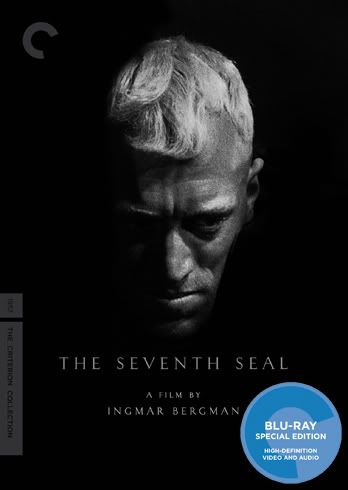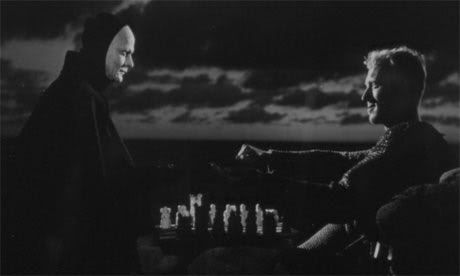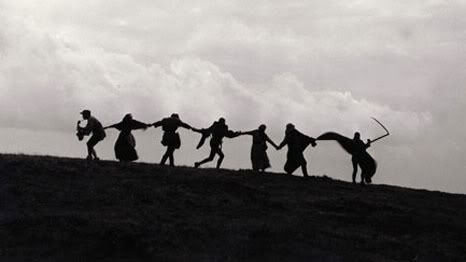The Seventh Seal

Title: The Seventh Seal
Rating: 3.5/5
Genre: Philosophical Drama
Starring: Max von Sydow, Gunnar Björnstrand, Bengt Ekerot
Director: Ingmar Bergman
Language: Swedish
 So you can mock me all you want, but this is my first Bergman film. I know, a self-confessed music fanatic who hasn't seen one of his works, well you can laugh it up but- wait, you haven't heard of him? That wasn't a snort of derision but at the fact he's too 'old' for you? That this '57 classic is somehow not worthy of you? Or that because he's Swedish he's somehow inferior to the Hollywood budgets of today? This is a man that didn't use tricks or effects to make his films, he used ideas, and this one in particular is one that really makes you stand up and pay attention. Hollywood bigwigs, pay attention, this one is ripe for a re-make. Actually, on second thoughts sit back down. You'd only screw it up.
So you can mock me all you want, but this is my first Bergman film. I know, a self-confessed music fanatic who hasn't seen one of his works, well you can laugh it up but- wait, you haven't heard of him? That wasn't a snort of derision but at the fact he's too 'old' for you? That this '57 classic is somehow not worthy of you? Or that because he's Swedish he's somehow inferior to the Hollywood budgets of today? This is a man that didn't use tricks or effects to make his films, he used ideas, and this one in particular is one that really makes you stand up and pay attention. Hollywood bigwigs, pay attention, this one is ripe for a re-make. Actually, on second thoughts sit back down. You'd only screw it up. When a noble knight, Blok, freshly back from the holy crusades arrives at the end of his life, it isn't some bright light he sees but the shadowy robed figure of death; a man who doesn't just guide you to the afterlife once you've passed on, but seems to take great delight in also killing you first. And like all men when faced with such a situation, he challenges Death to his favourite game: Chess (because who wouldn't). Engrossed in their game, as Death leaves to perform his other duties he permits the knight to live, so that he too might indulge in his own, final wish; to answer questions he has about his faith and of the very nature of humanity. It is in this journey that he encounters a number of people with very different outlooks, from the troubadours trying to make a living, smiling in the face of adversity; the thief descended from his once respectable position; and the witch, considered the source of the plague and sentenced to be burnt at the stake.
Truth be told, this is my favourite kind of philosophical film; one that doesn't require an in depth knowledge of the works of Kant, Sartre and Nietzche to comprehend, free from pretentious and overly complex arguments, free – in fact – from feeling like their philosophising at all. It doesn't ask questions promising that 'there is no correct answer,' and then scoff as you somehow arose to an opinion different to theirs, and for a film involving religion, it's astounding just how neutral on the subject he remains. There are some genuinely poetic lines found in this films penmanship, almost Shakespearean in their ability to say so much with so few words and it's this that is perhaps the real gem here; whether we merely made an idol of our fear and called it God, or there genuinely is some divine intervention to permit miracles and plagues to happen to the deserving. In each case it's left open to interpretation, asking the question but leaving the answer hanging for the viewer to decide for themselves.
I'd love to come out and say it's glorious! A masterpiece as relevant today as it was more than 50 years ago! But it's not, at least not to my mind. At this point it feels a little tired, none of the questions really feeling altogether profound; none of the
 questions raised unique or explored in any more detail than I've heard before. There are points where it seems as though the audience is reading between the lines so much, that you wonder if it really isn't this pointless in it's meandering, and that you're filling in the blanks in far more depth than was ever intended. There is certainly a sort of beauty in the contrast between our almost naïve troubadour, content in life's simplicity and Blok's tormented quest to find out answers to questions that have no answer, but it is the viewer that is forced to do a lot of the work, trying to figure out why he's showing us what seems like yet another scene without a real intention, for those few that do. As a result it all feels a little slow, and whilst poetic in it's mystery, you do sometimes wish he could hurry it up a bit.
questions raised unique or explored in any more detail than I've heard before. There are points where it seems as though the audience is reading between the lines so much, that you wonder if it really isn't this pointless in it's meandering, and that you're filling in the blanks in far more depth than was ever intended. There is certainly a sort of beauty in the contrast between our almost naïve troubadour, content in life's simplicity and Blok's tormented quest to find out answers to questions that have no answer, but it is the viewer that is forced to do a lot of the work, trying to figure out why he's showing us what seems like yet another scene without a real intention, for those few that do. As a result it all feels a little slow, and whilst poetic in it's mystery, you do sometimes wish he could hurry it up a bit.
Comments
Post a Comment